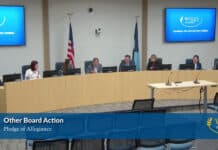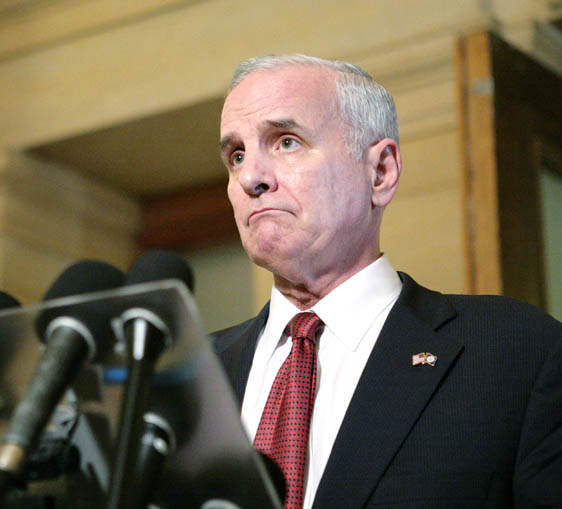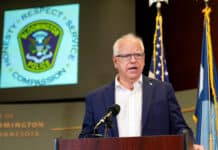ST. PAUL, Minn.- Governor Mark Dayton (D) and House Speaker Kurt Daudt (R-Crown) are fuming from the current budget bill negotiations, with both sides pointing fingers, after a meeting on April 25.
Daudt indicated that the governor demanded that the House and Senate negotiators resolve their differences before he joins the talks.
“[Dayton] changed his position and now he’s sitting out one full week,” Daudt indicated to MPR. Daudt figures Dayton is trying to gain leverage by intentionally delaying the resolution of the budget bills until the end of the session.
Dayton released a statement in response to Daudt:
“Speaker Daudt’s accusations are unfounded. I have made very clear the parameters of my engagement, both in writing and in two meetings with him and Senator Gazelka during the past five days. The house and senate need to reconcile their differences in Conference committee reports that establish the Legislature’s positions on the biennial budget and policy changes. I presented a balanced budget, reflecting my priorities in January (amended in March). When they have done the same we can begin to resolve our differences. However, I have been very clear that I will not negotiate with two different House and Senate budget bills, neither of which have been vetted for accuracy by Minnesota Management and Budget (a government entity responsible for reviewing the budget).”
Minnesota Senate Majority Leader Paul Gazelka (R-Nisswa), who was also present during the meeting with Dayton on Tuesday, indicated that the focus was mainly on four bills: agriculture, jobs, legacy, and transportation. Gazelka indicated that disagreements on these bills should be easy to resolve and that he would prefer a three-way negotiation.
Gazelka pointed out to Alpha News that the four bills indicated earlier were “historically less controversial than some of the biggest spending areas like Health and Human Services and K-12 Education. If we can reach agreement on these four first, it will provide good momentum for the legislature and Governor to work together on the rest of the budget.”
In a press conference on April 26, Dayton admitted that he stated in his first letter to the House Speaker and Senate majority leader that budget discussion would occur on April 28th and that he had made changes since that first letter in the requirements to be met by Minnesota Congress, though Dayton defended that he had communicated adequately with Daudt and Gazelka since then in this regard.
Currently, Dayton’s budget asks for a budget balance that takes a $1.6 billion dollar surplus down to a $200 million dollar surplus. The biggest budget increases from the February budget and the March revised budget is in education with a proposed $713 million dollar increase in E-12 education, with $318 million dollars in Higher education. The budget also proposes a $414 million dollar reduction in Health and Human Services.
Gazelka made the following statements about the House and Senate budget bills:
“The House and Senate want Minnesotans to receive significant tax relief, around $1 billion, while the Governor’s budget provides much less. HHS and Education are the two largest pieces of the state budget, comprising 30% and 40% of the budget respectively. Health and Human Services spending automatically balloons by 20% in the next biennium if we do nothing and simply continue to fund current services. Republicans think this spending trajectory is unsustainable and are trying to find ways to bend the cost curve down.”
In terms of E-12 education a major hangup was the Governor’s lack of support for vouchers in relation to pre-K education. Dayton accused Republicans of attempting to take away Pre-K education via the public schools and other after school programs via the voucher program. Dayton said that the “balance between publicly funded Pre-K education and tax cuts for businesses” was something that he, Daudt, and Gazelka would have to come to terms with.
Gazelka clarified the Republican stance on E-12 education by stating that:
“K-12 Education, which everyone considers a priority, the conversation centers around how the money is spent. The Governor wants new funding for pre-K, while the Republican plan prioritizes current classrooms.”
The transportation omnibus bill seems to also be a major point of disagreement, where Dayton stated that a “key point would be the funding of the Met Council.” There exist an $85 million dollar difference between the Senate and House compared to Met Council’s projected necessary funding to continue it current functions. Gazelka alluded too that this would be an uphill battle;
“Regarding the transportation bill, the last major boost in funding for roads and bridges was passed in 2008. The last two sessions failed to produce a transportation bill.”
Dayton said that “the unanimous and almost unanimous passage of the legacy bills” was a positive note and definitely something that would take little compromise when negotiations begin on the budget.
Dayton seemed to be very supportive of Gazelka during the press conference in the way that the Senate Majority Leader was taking a courteous and sincere stance in negotiating the budget. Gazelka in turn echoed this sentiment to Alpha News, stating that;
“The Governor and I have a good relationship, and I think all three leaders want to get our work done in a timely manner. The Governor originally set a deadline of April 28th to agree to a joint budget, but then he changed his mind and asked the House and Senate to work without him first. I would prefer to agree to a joint budget as soon as possible. The longer we wait, the more crunched we will be to get bills passed on time.”
Despite the partisan setback, Gazelka seemed confident that budget negotiations would move forward in statements made to the Pioneer Press.
“What I will say is the Senate and the House will adapt. The speaker is right that the first letter was ‘we’ll all have targets April 28th.’ (Dayton’s) added another step that says we have to come together and the House and Senate have to agree before he will engage with that,” Gazelka said. “So we’re going to adapt. We’re going to do just that and we are going to move just as fast as we can. … We are going to do our part to get it done.”


















